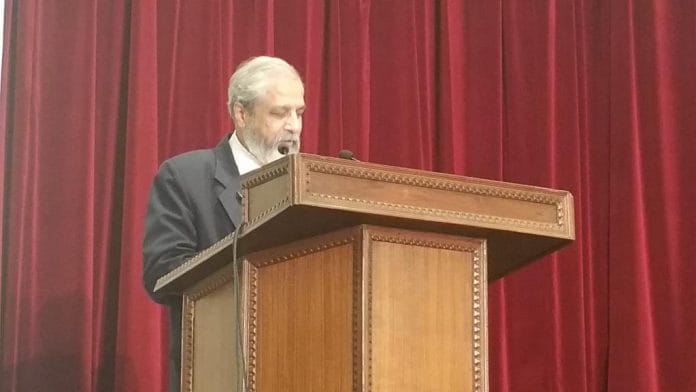Lokur, known for his liberal values, has often been criticised for exceeding his judicial role.
New Delhi: In the last few days, one particular bench of the Supreme Court has hit the headlines for its stinging remarks against the government.
The latest casualty of this bench, headed by Justice Madan B. Lokur, was Delhi’s Lieutenant Governor Anil Baijal. Lokur pulled up the “superman” L-G for the garbage piling up in the national capital.
Last month, union minister Hardeep Puri slammed the judicial committee’s sealing drive that is monitored by Lokur’s bench as “lacking in common sense”. To this, the judge responded sarcastically, asking the government counsel if common sense is available in the market.
Lokur, the third senior-most judge of the Supreme Court, is known in legal circles for taking the government to task. His hard-hitting observations against the bureaucracy have always raised eyebrows within the government.
These oral observations are not recorded in orders and have no legal sanctity, but they reflect the mood of the court.
Courts criticising the executive for inaction is hardly a new phenomenon. However, constant remarks from one particular bench have drawn criticism — that the bench is micromanaging the executive and exceeding its role.
In complete contrast to such criticism, Lokur is known in legal circles for his liberal values and pro-poor positions in judgments. Lokur’s work in court explains why the ‘social justice crusader’ is always angry at India’s sluggish bureaucracy.
The ‘social justice bench’
Lokur’s bench is popularly dubbed the ‘social justice bench’, given the nature of cases that come before it. The range of issues in the last few days have been garbage piling, slum clearance and protection of the Taj Mahal.
“These issues are usually where you see most government inaction, but these are also those that matter to the common citizens the most. Here it’s never the government that wants relief from the court,” explained a senior advocate who did not wish to be identified.
When asked why such all cases land up before Lokur, the advocate joked: “Well, his middle name is Bhimrao.”
However, in 2014, the apex court had constituted a special bench for speedy disposal of such cases. Justices Lokur and U.U. Lalit, who were handpicked to head this bench, would sit every Friday between 2-4pm.
Although the bench heard cases on issues such as rehabilitation of Kashmiri Pandits, abandoned widows of Vrindavan, Devadasis, utilisation of the Nirbhaya fund and circulation of rape videos among others, it did not come up with a single judgment even after a year. This prompted the court to shelve the idea.
In 2015, the social justice cases were re-distributed among various regular benches of the court. But in 2017, these cases were again clubbed and brought before Lokur’s bench.
In fact, according to Chief Justice Dipak Misra’s new roster issued last month, Lokur’s bench is the only other court that can hear public interest issues, apart from his own court.
The need for constant monitoring
Although it is the executive’s job to ensure orders of the court are complied with, it is not always done. It is not unusual for petitioners to come back to the court because the government has not fallen in line despite the court’s orders.
The judiciary developed a mechanism to deal with such instances — to issue “continuous mandamus”, a legal writ ordering where the court orders a person or entity to do something.
Lokur deploys this judicial innovation in many of his cases to ensure his orders are taken to the logical end. For example, the Right to Food case that eventually resulted in the National Food Security Act was monitored for 17 years before Lokur finally disposed of it in 2016. The Taj Trapezium case and the case related to Delhi’s air pollution have been pending for over 25 years.
Such minute monitoring often exposes the inadequacies of the bureaucracy to the judges. Delay in furnishing information, and the lack of coordination between central and state officials frustrate judicial efforts.
Liberal judge
Lokur is also known for his liberal values that often clash with the government’s views. The judge has been outspoken on issues such as the death penalty and homosexuality.
In 2015, nearly two years before the landmark privacy ruling declared sexual orientation as part of fundamental rights, Lokur had commented on the Modi government’s views on homosexuality.
“It is possible that the executive might have an objection to the sexual orientation of a person being considered for appointment as a judge,” Lokur wrote while striking down the National Judicial Appointments Act, the law that sought to give the executive a greater say in judicial appointments.
On death penalty, the judge had openly criticised the practice of dismissing appeals in such cases on technical grounds by the court’s registry even before they came up for hearing.
Lokur, a graduate of St. Stephen’s College, was appointed a judge of the Delhi High Court in 1999. Lokur’s middle name comes from his father Bhimji Narayanrao Lokur, who was a high court judge.
Before becoming a judge, Lokur was largely a government lawyer and had very little private practice. He was a standing counsel for the central government before he was appointed as the additional solicitor general. Lawyers point out that perhaps he understood the ways of the bureaucracy as a government lawyer; he entertains no such tricks now as a judge.
Lokur is also heading the court’s digitisation project, and the one-man committee to suggest improvements to the working of the juvenile justice law. His tenure ends in December this year.







Justice Lokur is a role Model for the legal fraternity. Govt. should heed to his advice.We salute him for his bold and fair decisions.